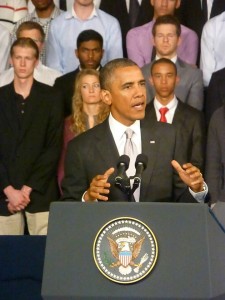Obama unveils $7 billion plan to 'Power Africa'


CAPE TOWN -- Speaking at the University of Cape Town on June 30, President Obama unveiled a $7 billion plan to double electricity generation in sub-Saharan Africa over the next five years. "Power Africa" is a U.S. government initiative to upgrade sub-Saharan Africa's power grid and spur foreign investment into the African power sector.
According to deputy national security adviser Ben Rhodes, Power Africa is "the next phase in our development strategy and a real focal point in the president's agenda going forward."
Power Africa is President Obama's most concrete policy aimed at Africa so far. The plan comes a year into his second term and in the middle of his first extended trip to the continent.
Even skeptics are hopeful that the plan could bring development to areas desperate for the investment. In Africa is a Country -- a blog often wary of foreign investment that promises to reshape the continent -- Siddhartha Mitter wrote of the plan "all infrastructure investment should be considered a good thing unless proven otherwise -- especially in Africa, where the need is so great."
Gayle Smith, director for development and democracy at the National Security Council, said, "If you want lights so kids can study at night or you can maintain vaccines in a cold chain" you need power. Smith, who is heading the program, said that two-thirds of people in sub-Saharan Africa have no access to electricity, and that rate can rise as high as 85 percent in rural areas. She said that alongside the government funds there are $9 billion in private-sector investments.
While many of the world's fastest-growing economies are in Africa, lack of basic infrastructure has hampered many nations as they try to pull their citizens out of poverty. Phil Hay, the World Bank's spokesman for Africa, told The New York Times that for Africa "to keep growing at this extraordinary rate it depends on more electricity."
One out of every six people on earth is African, yet the continent produces only four percent of the world's electricity. The U.S. has a population that is double the size of Nigeria's, yet generates 220 times the electricity that's generated in Nigeria.

Even in Cape Town, the picturesque seaside city that played host to the Obama speech, scheduled blackouts are routine during times when demand for power outstrips supply. In every case, a loss of power means a lost opportunity for local development. An entrepreneur can't reliably run a business without a dependable flow of electricity.
Beyond the initial government funding, Power Africa seeks to open up the African power sector to foreign investment, with a series of guarantees meant to lure outside capital into sectors that are often seen as too risky.
General Electric alone has pledged to produce 5,000MW -- half of the total 10,000MW that Power Africa aims to generate.
Power Africa is the Obama administration's first foray into large-scale development on the continent. In many countries, the program will run into well-established Chinese infrastructure projects. Obama said he welcomed the competition for development.
"I want everybody playing in Africa," he said. "The more the merrier."
In its first phase, Power Africa is set to roll out in six of Africa's 55 countries (Ethiopia, Ghana, Kenya, Liberia, Nigeria and Tanzania). Most of the investment will go towards building power plants and funding smaller, off-the-grid projects in those countries. The program also calls for partnerships with Mozambique and Uganda to help those countries manage newly discovered oil and gas reserves.
Photos: US Mission to South Africa and NASA
This post was originally published on Smartplanet.com